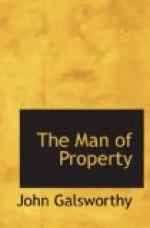Then came the news that June had gone to the seaside with old Jolyon.
He had carried her off to Broadstairs, for which place there was just then a feeling, Yarmouth having lost caste, in spite of Nicholas, and no Forsyte going to the sea without intending to have an air for his money such as would render him bilious in a week. That fatally aristocratic tendency of the first Forsyte to drink Madeira had left his descendants undoubtedly accessible.
So June went to the sea. The family awaited developments; there was nothing else to do.
But how far—how far had ‘those two’ gone? How far were they going to go? Could they really be going at all? Nothing could surely come of it, for neither of them had any money. At the most a flirtation, ending, as all such attachments should, at the proper time.
Soames’ sister, Winifred Dartie, who had imbibed with the breezes of Mayfair—she lived in Green Street—more fashionable principles in regard to matrimonial behaviour than were current, for instance, in Ladbroke Grove, laughed at the idea of there being anything in it. The ’little thing’—Irene was taller than herself, and it was real testimony to the solid worth of a Forsyte that she should always thus be a ’little thing’—the little thing was bored. Why shouldn’t she amuse herself? Soames was rather tiring; and as to Mr. Bosinney—only that buffoon George would have called him the Buccaneer—she maintained that he was very chic.
This dictum—that Bosinney was chic—caused quit a sensation. It failed to convince. That he was ‘good-looking in a way’ they were prepared to admit, but that anyone could call a man with his pronounced cheekbones, curious eyes, and soft felt hats chic was only another instance of Winifred’s extravagant way of running after something new.
It was that famous summer when extravagance was fashionable, when the very earth was extravagant, chestnut-trees spread with blossom, and flowers drenched in perfume, as they had never been before; when roses blew in every garden; and for the swarming stars the nights had hardly space; when every day and all day long the sun, in full armour, swung his brazen shield above the Park, and people did strange things, lunching and dining in the open air. Unprecedented was the tale of cabs and carriages that streamed across the bridges of the shining river, bearing the upper-middle class in thousands to the green glories of Bushey, Richmond, Kew, and Hampton Court. Almost every family with any pretensions to be of the carriage-class paid one visit that year to the horse-chestnuts at Bushey, or took one drive amongst the Spanish chestnuts of Richmond Park. Bowling smoothly, if dustily, along, in a cloud of their own creation, they would stare fashionably at the antlered heads which the great slow deer raised out of a forest of bracken that promised to autumn lovers such cover as was never seen before. And now and again, as the amorous perfume of chestnut flowers and of fern was drifted too near, one would say to the other: “My dear! What a peculiar scent!”




